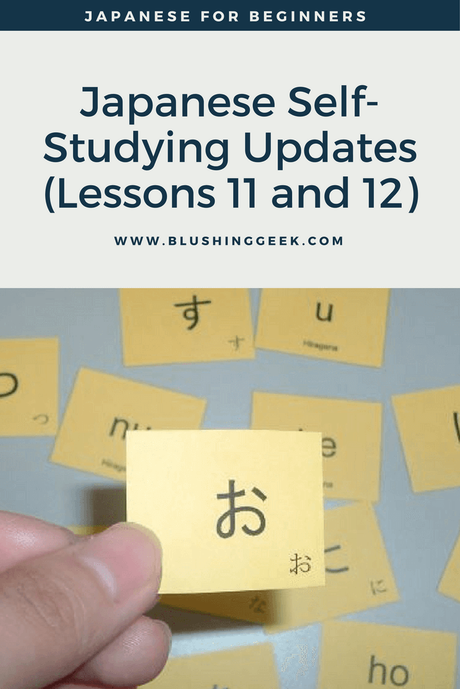Happy Monday fellow geeks! It’s the day of the week again for some new updates for my Japanese self-study! For the previous week, which were lessons 9 and 10, I’ve got to learn about the MASU form and some other particles. This week’s lessons we’re one of my most anticipated one as I’ve got to learn how to negate and transform MASU verbs to past tense as well as its past negation form. I’ve been singing anime songs and some of the words now makes sense. And that my friends makes me want to learn more!
And once again, this is not an attempt to create a tutorial but just sharing what I’ve learn from Misa-sensei’s Grammar Lessons for Absolute Beginners in Youtube. You can see what I’ve been learning from Lessons 1-10 here.
Note: Click on the lesson number to read the whole update.LESSON 11 – Negation of MASU Verbs
Negation of MASU Verbs:
- from MASU => MASEN
Examples:
- (to teach) oshieru => oshiemasu => oshiemasen
I don’t teach English
=> Eiga wo oshiemasen - (to watch) miru => mimasu => mimasen
I don’t watch horror movies
=> Horaa eiga wo mimasen
***
- week => shuu
- one week => isshuukan (one + week + period [period])
- two weeks => nishuukan
- next week => raishuu
- last week => senshuu
- weekend => shuumatsu (comes from shuu=>week and matsu=>end)
- work, job => shigoto (you can add o to make it more polite)
Example:
- What is your job?
=> Shigoto wa nani? (informal)
=> Shigoto wa nan desu ka? (formal)
=> Oshigoto wa nan desu ka? (very formal)
***
- to work => shigoto suru => shigoto shimasu
- to (going somewhere) => ni (particle)
***
Examples:
- I will go to work
=> Shigoto ni ikimasu - I don’t/won’t go to work
=> Shigoto ni ikimasen - I don’t go to work on weekends (as for weekends, I don’t go to work)
=> Shuumatsu wa shigoto ni ikimasen - I don’t work on weekends (as for weekends, I don’t work)
=> Shuumatsu wa shigoto shimasen
***
- meat => niku (you can add o to make it more polite)
- vegetarian => bejitarian
- vegan => biigan
- and => to (particle)
- strong => tsuyoi
- weak => yowai
Examples:
- I don’t eat meat
=> Oniku wo tabemasen - I’m a vegetarian. I don’t eat meat
=> Bejitarian desu. Oniku wo tabemasen - I don’t eat meat and fish
=> Oniku to sakana wo tabemasen - I don’t drink alcohol
=> Osake wo nomimasen - I’m a lightweight (lit. weak to alcohol)
=> Osake ni yowai - I’m a heavyweight (lit. can handle alcohol)
=> Osake ni tsuyoi - I’m a lightweight. I don’t drink alcohol
=> Osake ni yowai. Osaki wo nomimasen
***
- cigarette => tabako
- to smoke => suu
Example:
suu => suimasu => suimasen
- I don’t smoke
=> tabako wo suimasen
***
- newspaper => shinbun
- news => nyuusu
- not really, not very much => amari (formal), anmari (informal)
- insects => mushi
- not at all => zenzen
***
Examples:
yomu => yomimasu => yomimasen
- I don’t read newspaper
=> Shinbun wo yomimasen - I don’t really read newspaper
=> Shinbun wo amari yomimasen
or
=> Amari shinbun wo yomimasen - I don’t like insects at all
=> Mushi ga zenzen suki ja nai desu
or
=> Zensen mushi ga suki ja nai desu
***
Sometimes, they use zenzen with daijoubu
Example:
- Don’t worry, it’s fine
=> Zenzen daijoubu
– it’s technically wrong, but they usually use it in informal speeches.
***
- mother => haha
Examples:
to cook => riyouri suru => riyouri shimasu => riyouri shimasen
- I don’t cook at all
=> Zenzen riyouri shimasen - My mother doesn’t cook at all
=> Haha wa zenzen riyouri shimasen
Example:
tsukuru => tsukurimasu => tsukurimasen
- I make a pizza
=> Piza wo tsukurimasu - I don’t make a pizza
=> Piza wo tsukurimasen
***
- hikikomori => a person who stays at home all the time or a person who doesn’t go out.
- outside => soto
- to leave, exit => deru
Examples
deru => demasu => demasen
- I don’t go outside at all
=> Zenzen soto ni demasen - I’m hikikomori. I don’t go out at all
=> Hikikomori desu. Zenzen soto ni demasen
***
- to understand => wakaru
Examples:
wakaru => wakarimasu => wakarimasen
- I don’t understand
=> Wakarimasen - I don’t understand at all
=> Zenzen wakarimasen
New vocabularies learned from this lesson:
- horror => horaa
- horror movies => horaa eiga
- week => shuu
- one week => isshuukan
- two weeks => nishuukan
- three weeks => sanshuukan
- next week => raishuu
- last week => senshuu
- work, job => (o) shigoto
- meat => (o) niku
- vegetarian => bejitarian
- vegan => biigan
- strong => tsuyoi
- weak => yowai
- to smoke => suu
- cigarette => tabako
- newspaper => shinbun
- news => nyuusu
- not really, not very much => amari (formal), anmari (informal)
- not at all => zenzen
- insects => mushi
- mother => haha
- to make => tsukuru
- a person who always stays at home => hikikomori
- outside => soto
- to leave, exit => deru
- to understand => wakaru
LESSON 12: Past Tense and Past Negation of MASU Verbs
Negation
- masu => masen
Example:
- I don’t/won’t eat
=> Tabemasen
Past Tense
- masu => mashita
Example
- I ate
=> Tabemashita
Past Negation
- masu => masen + deshita
Example:
- I didn’t eat
=> Tabemasen deshita
Examples:
miru => mimasu => mimashita
- I saw the new movie
=> Atarashi eiga wo mimashita
- Did you watch/see?
=> mimashita ka?
***
mou – already
- or used to show frustration
- not anymore (if used with negation)
Example: already
- Did you already see the movie?
=> Eiga wo mou mimashita ka?
Example: not anymore
- I don’t watch anime anymore
=> Anime wa mou mimasen
***
Examples:
- I saw a movie
=> Eiga wo mimashita - What did you see/watch?
=> Nani wo mimashita ka? - I saw Spider Man
=> Supaidaa man wo mimashita - What did you eat?
=> Nani wo tabemashita ka?
yomu => yomimasu => yomimashita
- What did you read?
=> Nani wo yomimashita ka?
iku => ikimasu => ikimashita
- I went to a shop
=> Omise ni ikimashita
***
- shop => mise
- where => doko
- here (near the speaker) => koko
- there (near the listener) => soko
- over there (far) => asoko
- last year => kyonen
- who => dare
- with whom => dare to
- one person => hitori
- myself, alone => hitori de
- when => itsu
- last summer => kyonen no natsu (last year’s summer)
Examples:
- Where did you go?
=> Doko ni ikimashita ka? - I went to Japan
=> Nihon ni ikimashita - I went to Japan last year
=> Kyonen nihon ni ikimashita - With whom did you go? / Who did you go with?
=> Dare to ikimashita ka? - I went with my friends
=> Tomodachi to ikimashita - With my friends
=> Tomodachi to desu - I went there alone
=> Hitori de ikimashita - When did you go to Japan?
=> Itsu nihon ni ikimashita ka? - I went to Japan last summer
=> Kyonen no natsu nihon ni ikimashita
***
- why – doushite (formal), nande (informal)
- to choose – erabu
Examples
erabu => erabimasu => erabimashita
- Why did you choose this?
=> Doushite kore wo erabimashita ka? - I chose it because it’s cute
=> Kawaii kara, erabimashita
Note 2: You can say you chose it first but in writing, the reason should always mentioned first.
***
- yesterday => kinou
- to be late => okureru
Examples:
- I didn’t go to work yesterday
=> Kinou shigoto ni ikimasen deshita
asobu => asobimasu => asobimashita
- I hung out with my friends
=>Tomodachi to asobimashita
okureru => okuremasu => okuremashita
- I’m late
=> Okuremashita - Sorry, I’m late
=> Sumimasen, okuremashita - I was not late
=> Okuremasen deshita
***
- university, college => daigaku (comes from ookii => big and gakkou => school)
- math => suugaku
- cafe => kafe
Examples:
- I studied math in university
=> Daigaku de suugaku wo benkyou shimashita
hanasu => hanashimasu => hanashimashita
- I talked with my friends in the cafe
=> Kafe de tomodachi to hanashimashita - What did you do on the weekend (as for weekends, what did you do?
=> Shuumatsu wa nani wo shimashita ka? - I worked on the weekend (as for weekends, I worked)
=> Shuumatsu wa shigoto shimashita - I studied Japanese
=> Nihongo wo benkyou shimashita - I read books at home
=> Uchi de hon wo yomimashita - I watched tv at home
=> Uchi de terebi wo mimashita - I went to the cinema
=> Eigakan ni ikimashita - I listened to music
=> Ongaku wo ikimashita
New vocabularies learned from this lesson:
- spider man => supaidaa man
- store => (o) mise
- where => doko
- here (near the speaker ) => koko
- there (near the listener) => soko
- over there (far) => asoko
- last year => kyonen
- who => dare
- with whom => dare to
- one person => hitori
- myself, alone => hitori de
- when => itsu
- last summer => kyonen no natsu
- why => doushite (formal), nande (informal)
- to choose => erabu
- because => kara
- yesterday => kinou
- to be late => okureru
- university, college => daigaku
- school => gakkou
I just studied these two lessons yesterday and I’m still going through with them over and over again until I finally get to familiarize and memorize them. I’m only with lesson 12 but I’ve been learning alot and I can’t thank Misa-sensei enough. I’m so excited to learn more!
For the previous lessons, you can refer to my previous updates for lessons 1-10. If you want to study Japanese language as well, I am highly recommending Misa-sensei’s youtube tutorial for Japanese Grammar Lessons for Absolute Beginners. Jaa mata ne!


